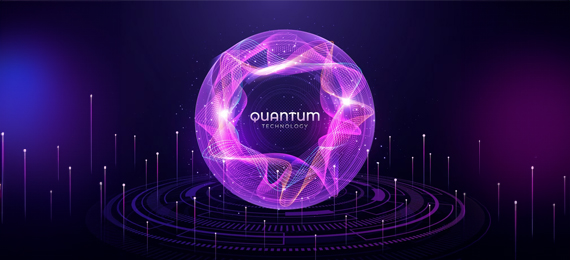
In this technological era, quantum computing has emerged as a groundbreaking field that holds immense potential for revolutionizing computation. This blog provides an overview of what is quantum computing, how it works, and its benefits.
Let’s get started!
What is Quantum Computing?
Quantum computing is a revolutionary computing paradigm that harnesses the principles of quantum mechanics to perform computations, vastly different from traditional computers. Unlike classical computers that operate on bits representing 0 or 1, quantum computers utilize quantum bits or qubits.
In What Year Were Algorithms Developed?
- A. 1990
- B. 1991
- C. 1992
- D. 1994
Qubits have the remarkable ability to exist in a superposition state, where they can represent both 0 and 1 simultaneously. This unique characteristic opens up a world of possibilities, allowing quantum computers to solve problems faster than traditional computers.
A team of scientists from Forschungszentrum Jülich in Germany and the IBS Center for Quantum Nanoscience (QNS) in Korea has created a quantum sensor that can measure magnetic fields at the atomic scale. This pioneering work realizes a long-held dream of scientists: an MRI-like tool for quantum materials.
Quantum Computers 60 Minutes Need to know about this :
When Was The First Quantum Computer Built? (Evolutionary History)

- In the early 1990s, researchers named, Peter Shor and Lov Grover, developed algorithms that showcased how quantum computers performed certain tasks, including factoring large numbers and searching databases, exponentially faster than classical computers.
- In 1994, the first experimental demonstration of quantum algorithms was performed using a small number of atoms as quantum bits, or qubits, by a team led by Issac Chuang at the Los Alamos National Laboratory. For the next several years, researchers made significant progress in developing and demonstrating the capabilities of quantum computers.
- In 2001, the first quantum computer was built using superconducting qubits by a team led by computer scientist, John Martinis, at the University of California, Santa Barbara. Since then, quantum computing has made significant strides, and top tech companies like Google, IBM, and Microsoft are starting to invest heavily in the field.
How Does Quantum Computing Work?

The functions of quantum computers can be quite complex, but let’s get started to know the fundamental principles.
- Quantum computers usually share some properties with classical ones. For example: both types of computers have chips, logic gates, and circuits. Their operations are directed by essentially sequential instructions (algorithms), and they use a binary code of zeros and ones to represent information.
- Both classical and quantum computers use physical objects to encode ones and zeros.
- Classical computers encode binary digits (bits) in two states.
- Meanwhile, quantum computers use quantum bits, or qubits, which help process information differently.
Qubits and Superposition
- In quantum computing, qubits are the basic units of information. They can exist in a superposition state, where they can simultaneously be 0, 1, or both. The states of multiple qubits can be entangled.
So, what is entanglement?
Entanglement
- Entanglement is a unique phenomenon in quantum mechanics where two or more qubits become correlated, sharing the same state. This interconnectedness allows for instantaneous communication and parallel processing.
Quantum Algorithms
- Quantum algorithms are specifically designed to exploit the unique properties of quantum systems. They enable quantum computers to solve complex problems exponentially faster than classical computers.
Why Do We Need Quantum Computers?

We will now delve into the key advantages offered by quantum computing and explore its potential to reshape various fields.
1. Processing Speed
Quantum computing leverages superposition, where qubits can exist in multiple states simultaneously. This allows quantum computers to perform certain computations exponentially faster than traditional computers.
2. Enhanced Optimization and Problem-Solving
Quantum algorithms are specifically designed to find optimal solutions to tackle some complex problems, such as finding the optimal configuration for a logistics network or determining the optimal portfolio for financial investments.
3. Discovery Of Drugs
Quantum computing can accelerate drug discovery by simulating molecular interactions and optimizing drugs.
4. Cybersecurity
Quantum computing has a direct impact on privacy and encryption and offers opportunities for developing new, unbreakable encryption methods. QKD (quantum key distribution) is a promising application that utilizes quantum mechanics to distribute cryptographic keys with absolute security and keep the data encrypted while in use.
To know the cybersecurity threats in recent years, tap the link to know more.
5. Quantum Machine Learning and Artificial Intelligence
To automate and optimize tasks, most of the organizations use AI and ML. When used in combination with quantum computing, optimization will happen much faster, especially when processing and analyzing highly complex, even unstructured, big data sets, leading to improved accuracy and efficiency.
6. Manufacturing
Quantum computers can run more accurately and with more realistic prototyping and testing. This could help reduce the cost of prototyping and result in better designs that don’t need as much testing in the manufacturing space.
Do quantum computers exist?
Yes, quantum computers do exist, even though they are nonetheless in the early tiers of improvement and are not extensively reachable. Unlike classical computer systems, which use bits to manner information in binary shape (0s and 1s), quantum computer systems use quantum bits or qubits, that could exist in multiple states simultaneously due to the principles of quantum mechanics.
These qubits allow quantum computers to perform complicated calculations an awful lot quicker than classical computers, probably revolutionizing fields like cryptography, drug discovery, and optimization problems. Companies like IBM, Google, and Microsoft, in addition to research institutions, are actively working on growing quantum computing generation.
What Are The Types of Quantum Computing?
a. Superconducting
Superconducting quantum computers are one of the most popular types. These quantum computers are usually made from superconducting materials that utilize tiny electrical circuits to produce and manipulate qubits. Gate operations will be performed quickly while using the superconducting qubits.
b. Photonic
c. Neutral Atoms
Neutral atoms offer another promising avenue for quantum computing. Researchers can create highly controllable systems with extended coherence times by trapping individual neutral atoms with laser beams. Neutral atom-based quantum computing is still in its early stages, but it holds the potential for scalable and fault-tolerant systems.
d. Trapped Ions
It is one of the leading physical implementations of qubits and has been central to many experiential advances in quantum computing. Trapped ion qubits are characterized by their high fidelity, long coherence times, and ability to perform complex quantum operations. Ion-trap quantum computing is a mature field with a proven track record of scientific breakthroughs and technological advancements.
e. Quantum Dots
Quantum dots function as the cornerstone of quantum computing. These semiconductor nanostructures show off homes intermediate between those of atoms and bulk semiconductors. Quantum dot-based computing faces demanding situations in phrases of scalability and decoherence, but it gives particular blessings for precise programs.
Conclusion
Quantum computing is a frontier technology that offers a wide range of benefits that hold the potential to revolutionize various fields and industries. While quantum computing is in its early stages, the tireless efforts of researchers are paving the way for a future where we can anticipate even more transformative applications that will shape the future of technology and innovation.